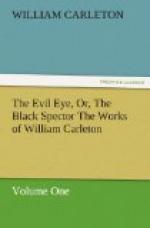“Not in the parlor,” said his mistress; “a strolling knave like him. Who ordered him his breakfast in the kitchen without my knowledge?” she asked. “The moment I can find out the person that dared to do so, that moment they shall leave my family. Must I keep an open house for every strolling vagabond in the country?”
“If you choose to turn me out,” replied her husband, “you may try your hand at it. It was I ordered the poor man his breakfast; and, what is more, I desire you instantly to hold your peace.”
As he spoke, she saw that one of his determined looks settled upon his countenance—a pretty certain symptom that she had better be guided by his advice.
“Come, Barney,” said he, “throw up that window and send the poor man here, until he tells us what he knows about this affair.”
The window was accordingly thrown open, and in a few minutes Bandy Brack made his appearance outside, and, on being interrogated on the subject in question, took off his hat, and was about to commence his narrative, when Lindsay said,
“Put on your hat, Bandy; the sun’s too hot to be uncovered.”
“That’s more of it,” said his wife; “a fine way to make yourself respected, Lindsay.”
“I love to be respected,” he replied sternly, “and to deserve respect: but I have no desire to incur the hatred of the poor by oppression and want of charity, like some of my female acquaintances.”
“Plase your honor,” said Bandy, “all that I know about the Shan-dhinne-dhuv, or the Black Spectre, as the larned call him, won’t require many words to tell you. It’s not generally known what I’m goin’ to say now. The haunted house, as your honor, maybe, remimbers, was an inn—a carman’s inn chiefly—and one night, it seems, there came a stranger to stop in it. He was dressed in black, and when he thought it time to go to bed he called the landlord, Antony McMurt, and placed in his hands a big purse o’ goold to keep for him till he should start at daybreak, as he intended, the next morning. Antony—
“Ay,” said Lindsay, interrupting him, “that accounts for the nature of the villain’s death. I remember him well, Bandy, although I was only a boy at the time; go on—he was always a dishonest scoundrel it was said—proceed.”
“Well it seems, Antony, sir, mistook him for a Protestant parson; and as he had a hankerin’ afther the goold, he opened a gusset in the man’s throat that same night, when the unsuspectin’ traveller was sound in that sleep that he never woke from in this world. When the deed was done Antony stripped him of his clothes, and in doing so discovered a silver crucifix upon his breast, and a bravery (breviary) under his head, by which he found that he had murdhered a priest of his own religion in mistake. They say he stabbed him in the jigler vein wid a middoge. At all events, the body disappeared, and there never was any inquiry made about it—a good proof




